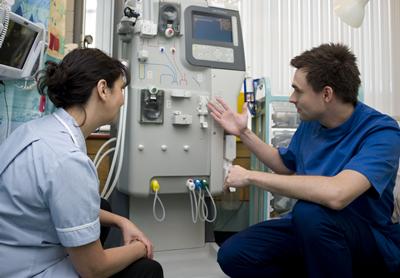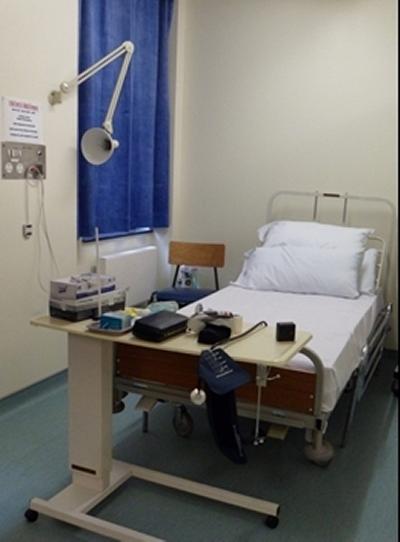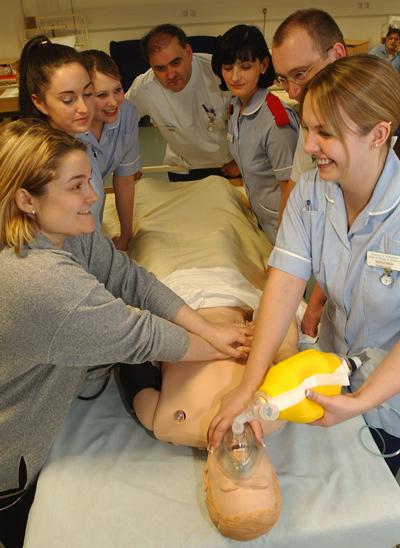We asked nursing students what advice they could give to help you get on well during your time in clinical placement and offer their answers to you as a 'survival guide'. This is what they said in their own words.
Kim suggests...
To smile, be friendly and just show willingness. Not necessarily initiate, ‘cos you can't do that straight away, but just show willing definitely. And respect your mentors; you've got to respect the people, even if you don't particularly like them that much. Because that's what you are, you're a student nurse, you're there to learn.
Christina's opinion is...
I would say just to make the most of everything, just to ask loads of questions, make sure you understand everything. Get a notebook and write down anything that's useful. Keep a diary of everything, every experience you have. Make notes of drugs. Ask to do things. If somebody offers you to do something, if you think you can do it, go for it. Go on lots of visits. Just take every opportunity you can get.
Lauren says...
Just get involved, do what you can, try and learn as much as you can.
Angela's tip is...
I got told a very good tip in theatre actually, which was never to feel comfortable as a student in any area. Which is very true, and that's my approach to things. I'm here for this certain amount of time. OK let's learn about what goes on here, let's see what I can develop and what I can do and be capable of, what challenges I might face, bring them on. Because I mean that's a very good approach for being a student.
Rebecca comments...
I would say just get stuck in with the learning manual handling and essential care. Don't worry about drugs, don't worry about going off ward, don't worry about any of those things, don't even try to do it. Show that you're willing to work hard, do what they ask of you. And when you've built up a relationship, maybe in the latter part of the placement, say, "Would you mind if I do this? Would it be possible to do this?"
Amber believes that you should...
Take every opportunity you're offered. Just get stuck in, go for it. While you've got a mentor there you've got someone looking over your shoulder permanently, you can't go wrong, just give it a go... It's quite nice to have someone to fall back on...if it goes wrong you've got someone there behind you to put it right straight away.
Emily's advice is...
Expect everything and anything, because you don't know what you're going to get. But I think, because I had certain expectations of doing which I didn't get to do, I think you've just got to keep optimistic and open-minded and go with the flow. You need to be calm, cool and collected.
Lisa suggests...
To stick at it, be prepared for the worst, ‘cos then everything else is better. And, I don't know, I suppose being on this placement prepares you for the next one, but nothing can really prepare you for your first placement, I don't think. Just try and seek out all the learning opportunities, ‘cos they won't come to you. Some [opportunities] came from the other students, they'd say, "Oh I'd done this today, I went and watched an operation," and you'd be thinking, "Oh I didn't know we could do that," so then I'd ask. Or from working with the military nurses and realising their expectations of you made you realise the expectations you should have of yourself. So then I would say that to my mentor and question her more about the drugs or the side effects and what does that mean, and things like that.
Heather passes on what she was told
Oh my goodness; study. I've had this told to me by second years and third years, "As soon as you get there, I know first year doesn't count for much," this is what they said, "like the first year your marks just pass stuff, it's fine. Second and third year it gets really tough, learn it while you can, and have the time." And then you get consumed by just not doing that. And then you realise that it's actually really important to do those things, and you kind of feel quite out of your depth, and maybe you should have paid more attention to those lectures.
Samantha remarks...
I'd say don't be afraid to be assertive and don't be afraid to ask for help, don't try and run a bay on your own. And make sure you're asking for learning opportunities, ask to shadow a drug round, or ask to watch IV being drawn up or, you know, really look for things to observe. Ask lots of questions.
Kath had concerns...
I just thought like this was going to be the most horrible experience of my life. And it wasn't, I really enjoyed it. But that really worried me initially.



